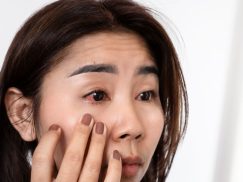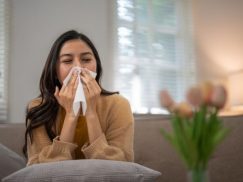Ah, the great outdoors!
There’s nothing like a gentle breeze and the warm sun on your face. But lurking among the grass and trees are some not-so-friendly tiny creatures ready to put a damper on your outdoor fun.
From pesky mosquitoes to stealthy ticks, these little critters can cause more than just an itchy bump. Their bites may lead to uncomfortable skin reactions or even transmit diseases. It's essential to know what you're up against so you can protect yourself and your loved ones.
We'll explore the ins and outs of insect bites and tick encounters, empowering you with knowledge to recognize symptoms, understand risks, and look into both conventional and holistic approaches to relief and prevention.
So before you head out on your next adventure, take a few minutes to arm yourself with the information you need. Feeling better prepared will ensure that the only buzzing you’ll experience is the joy and excitement of spending time in nature. Once you’ve got the facts, don’t hesitate to connect with our healthcare providers in NY to discuss your concerns further or tailor a prevention plan just for you.
Common Insect Bites
When it comes to insect bites, some culprits are more common than others, leaving us with telltale signs that can range from mildly annoying to downright painful.
Mosquitoes are the classic offenders, with their bites often leading to itchy, red bumps that can drive you to distraction. They might be small, but they sure know how to leave their mark!
Bees and wasps deliver stings that pack a punch, often resulting in immediate pain, swelling, and redness. The impacted area can remain tender for a few days as it heals.
Spiders, on the other hand, are more selective biters, often doing so only when threatened. While most bites are harmless, they can cause itching and redness that need some attention.
Ants, particularly fire ants, have a painful bite that can lead to a burning sensation, along with swelling and redness. Multiple bites can intensify these symptoms.
Fleas tend to latch on with tiny, itchy bites, often in clusters, leaving behind little red spots.
While most bites result in temporary discomfort like redness, swelling, pain, or itching, it's crucial to recognize when these symptoms escalate.
If you experience significant pain, difficulty breathing, swelling beyond the bite area, or signs of infection, it may be time to come see us for a more comprehensive evaluation. Your health and peace of mind are always our top priorities!
Tick Bites and Their Risks
Ticks are sneaky little critters that thrive in wooded, grassy areas and even gardens, waiting for an unsuspecting host to brush by. Whether you’re hiking, gardening, or enjoying a picnic, it's crucial to be aware of their favorite hangouts.
These tiny arachnids are not only bothersome; they can transmit a variety of illnesses. Lyme disease is perhaps the most well-known tick-borne condition, with symptoms like fever, fatigue, and a distinctive bulls-eye rash. Other potential illnesses include Rocky Mountain spotted fever, which can cause headaches, fever, and a spotted rash.
It's important to recognize these signs and symptoms. If you notice unexplained fevers, chills, or muscle aches after possible tick exposure, it's wise to keep tick-borne illnesses in the back of your mind.
Timely removal of ticks is crucial to reduce your risk. Use tweezers to carefully pull the tick straight out, ensuring you’ve removed the entire body. After removal, monitor the site and your general health for any changes.
Remember, swift action and observation are key!
If you have any concerns or questions, we're here to support you on your path to well-being, helping you maintain your adventurous spirit without the worry.
Prevention Tips
Preventing insect bites and tick encounters is all about taking proactive steps before heading outdoors. Dressing smartly is key: wear long sleeves, long pants, and tuck your socks into your shoes to create a physical barrier against these unwelcome guests.
After spending time outside, especially in wooded or grassy areas, perform thorough tick checks. Pay special attention to hard-to-see spots like your scalp and behind your ears, where these sneaky little bugs like to hide.
Exploring natural repellents can also be effective. Citrus notes from lemon and eucalyptus oils are off-putting to insects, while lavender and tea tree oils offer fragrant protection. These natural options can be a soothing and pleasant way to keep bugs at bay.
Traditional repellents such as DEET are another strong line of defense. Consider permethrin-treated gear if you spend extended periods outdoors, as it can effectively ward off ticks and insects.
Don't forget to maintain your outdoor spaces! Keeping grass trimmed and steering clear of brushy areas can reduce the number of insects and ticks around you. With a little preparation and these tips in your back pocket, you can minimize your exposure and enjoy nature with fewer worries.
What to Do If You’re Bitten
When you notice a fresh bite, the first step is to clean the area thoroughly with soap and water. This simple action can help reduce the chance of infection and promote faster healing.
If it’s a tick bite, carefully remove the tick using tweezers. Grip it as close to the skin as possible and pull steadily upward. If you can, save the tick in a sealed container for possible identification later. This could provide valuable information if symptoms develop.
At home, soothing remedies can work wonders for minimizing discomfort. Applying calendula cream or aloe vera can help calm irritation and reduce redness. If itching or inflammation is bothersome, consider a paste made from bentonite clay or baking soda for a natural relief.
After treatment, keep an eye on the bite area for any signs of infection such as increased redness or pus. Be mindful of systemic symptoms that could indicate an allergic reaction, like difficulty breathing or swelling.
Staying attuned to your body’s signals is vital. Don’t hesitate to reach out to us if you have concerns or notice any unusual symptoms. We’re here to provide guidance and ensure you stay healthy and comfortable.
When to See a Healthcare Provider
While many insect bites are harmless and can be managed at home, there are times when seeing a healthcare provider is essential.
Keep an eye out for signs of infection such as fever, a spreading rash, pus, or swelling that worsens over time. These symptoms might indicate that the bug bite needs more than just simple at-home care.
Tick bites can sometimes lead to tick-borne illnesses. Watch for symptoms like fever, chills, body aches, or a distinctive rash, such as a bulls-eye mark. If you spot these signs, it’s crucial to consult a healthcare provider for further evaluation.
Allergic reactions, although less common, require immediate attention. If you experience swelling of the face or lips, difficulty breathing, or intense itching, it's important to seek medical help right away.
In some cases, a healthcare provider might recommend lab testing to rule out infections or prescribe medications to tackle symptoms effectively.
Swift intervention ensures the best outcomes, so don’t hesitate to schedule an appointment with us to address your concerns and keep your health on track. Remember, peace of mind and your well-being are always our top priorities!
Conclusion
Insect and tick bites are a part of life, especially for those who love spending time outdoors. While most bites are harmless and resolve on their own, it's important to recognize that some can lead to more serious complications if not addressed properly.
The good news is that prevention and prompt care hold the key to staying healthy. By understanding common insect behaviors, practicing preventive measures, and knowing when to seek help, you're already several steps ahead in taking care of your well-being.
If you or a loved one has been bitten or you're unsure about a skin reaction, don't leave it to chance. Our experienced primary care team is here to support you. Schedule an appointment at one of our convenient locations today to get expert care and peace of mind.
We're committed to keeping you safe and healthy, so you can enjoy all the wonderful experiences the great outdoors has to offer!










